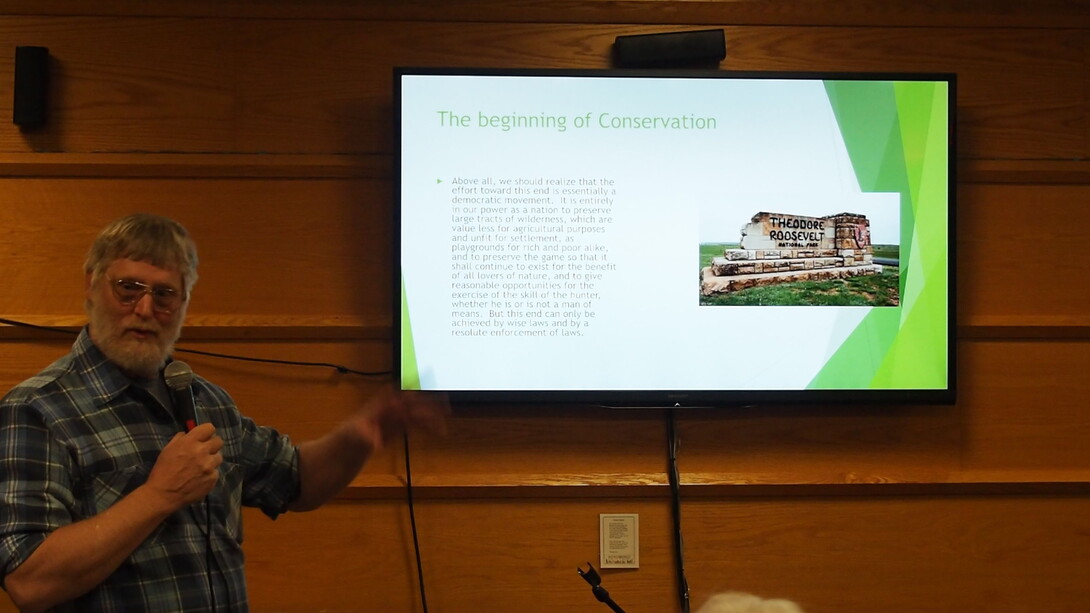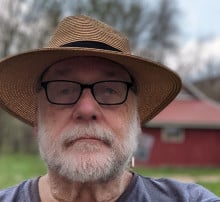Text Courtesy of Lorene Vedder
Jim Swanson, local environmentalist, presented “An American Heritage: Public Lands in the U.S.” at the Menomonie Public Library on January 21. He started out with contrasting the land ownership of the First Nation People, the American Indians, and the European Immigrants. Indian families and clans owned lands and these lands were passed down from mother to daughter. Animals were believed to have a right to the land. There was the philosophy of the “7th generation” which urges the current generation of humans to live and work for the benefit of the seventh generation into the future.
In contrast, the Europeans the Europeans wanted to get rid of the Indians, trees and wilderness and use the land for farming. During the Lincoln presidency, the Homestead Act was passed to encourage settlers to gain ownership of land by making “improvements”. There was an unlimited exploitation of resources with destruction of forests, loss of wildlife and extinction of species. Environmental consequences of this exploitation resulted in massive flooding of the Mississippi River and huge forest fires in Wisconsin, Minnesota, and Wyoming. As the population shifted from rural to urban by the early 1900’s more than half of the nation’s population resided in cities. At that time, there was a movement to “go out into the wood’s” for exercise and recreation to improve physical and emotional well-being. Land was set aside for the “rich and poor alike”. The first National Park was Yellowstone National Park. This has served as a model for National Parks created around the world. The National Park systems has evolved into an array of parks, national monuments, lakeshore, seashores, trails and waterways. Other public lands are the National Forest Service, the Bureau of Land Management, and the U.S. Fish and Wildlife Service. The State of Wisconsin has followed in setting up a park system starting with the Pennisula State Park which now includes a number of parks, trails, state and county forests, recreation areas and natural areas (for unique and fragile ecosystems). Private lands receiving special tax reductions are set aside for public use for activities such as hunting, bird watching and berry picking. Problems with an independent DNR protected from political maneuvering began under Governor Tommy Thompson. The appointment of the DNR Secretary was taken away from an independent Natural Resources Board and was given to the Governor’s office. With Governor Walker in 2010, the DNR lost its status as a state agency. Control of the agency and its employees came under the office of the governor. Citations issued by the DNR have dropped 50% since 2010. The agency has been defunded with budget cuts and scientific positions have been eliminated. The governor has not allowed an increase of hunting and fishing licenses. Wisconsin Representative Adam Jarchow, an anti environment and anti conservation ALEC member, has introduced plans to terminate the DNR and divide its stewardship funds, scientists, forestry division and law enforcement departments between other agencies in the Wisconsin government. There is a state wide concern about Wisconsin’s failure to enforce the Federal Clean Water Act. A group of Wisconsin citizens has appealed to the Federal EPA but there now is the concern that President Trump’s Administration will not follow through on the protections offered by the Clean Water Act. Other concerns in Wisconsin are the sell off of DNR wildlife areas to maintain stewardship funds. With state budget cuts, camping areas and trails have been closed. Wild areas have been eliminated. State Parks are no longer funded by our taxes and the user fees are unable to keep up with the support of these public lands. Sponsorships are being sold for state and federal parks. Corporations own the hotels, concessions and campgrounds. This is the privatization of public lands. Flow-ages can be drained for mining, forests can be clear cut, public lands are lost. Campaign donors are allowed the privilege to buy valuable land at low prices. Jim Swanson sees hope that our hunters and sportsmen will continue to advocate for public lands for recreation and for protecting wildlife. They are part of the Republican voting block that can have an influence on our state’s legislation. The next Community Conversation will feature “Citizen GE” from the book “Who will tell the People” by William Greider. This will examine the dysfunction of both political parties and the loss of representation of the American public in our governance. This session is on February 18 at the Menomonie Public Library from 1-3 PM. The public is welcome.
Support local news with a membership!
Steve Hanson
About
Steve is a web designer and recently retired from running the hosting and development company Cruiskeen Consulting LLC. Cruiskeen Consulting LLC is the parent company of Wis.Community, and publication of this site continues after his retirement.
Steve is a member of LION Publishers and the Local Media Association, is active in Health Dunn Right, and is vice-president of the League of Women Voters of the greater Chippewa Valley
News Section



Add new comment